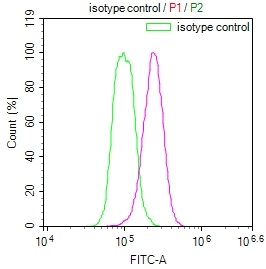-
中文名称:kgp兔多克隆抗体, HRP偶联
-
货号:CSB-PA464342LB01EXZ
-
规格:¥880
-
其他:
产品详情
-
产品名称:Rabbit anti-Porphyromonas gingivalis kgp Polyclonal antibody
-
Uniprot No.:
-
基因名:kgp
-
别名:kgp antibody; PGN_1728Lys-gingipain antibody; EC 3.4.22.47 antibody; Lysine-specific cysteine proteinase Kgp) [Cleaved into: Lys-gingipain catalytic subunit; 39 kDa adhesin; 15 kDa adhesin; 44 kDa adhesin] antibody
-
宿主:Rabbit
-
反应种属:Porphyromonas gingivalis
-
免疫原:Recombinant Porphyromonas gingivalis Lys-gingipain protein (229-594AA)
-
免疫原种属:Porphyromonas gingivalis
-
标记方式:HRP
-
克隆类型:Polyclonal
-
抗体亚型:IgG
-
纯化方式:>95%, Protein G purified
-
浓度:It differs from different batches. Please contact us to confirm it.
-
保存缓冲液:Preservative: 0.03% Proclin 300
Constituents: 50% Glycerol, 0.01M PBS, pH 7.4 -
产品提供形式:Liquid
-
应用范围:ELISA
-
Protocols:
-
储存条件:Upon receipt, store at -20°C or -80°C. Avoid repeated freeze.
-
货期:Basically, we can dispatch the products out in 1-3 working days after receiving your orders. Delivery time maybe differs from different purchasing way or location, please kindly consult your local distributors for specific delivery time.
-
用途:For Research Use Only. Not for use in diagnostic or therapeutic procedures.
相关产品
靶点详情
-
功能:Cysteine proteinase with a strong preference for substrates with Lys in the P1 position. Hydrolyzes bovine hemoglobin, bovine serum albumin, casein, human placental type I collagen and human IgA and IgG. Disrupts the functions of polymorphonuclear leukocytes. May act as a virulence factor in the development of peridontal disease. Involved in the coaggregation of P.gingivalis with other oral bacteria.
-
基因功能参考文献:
- a significant fraction of SPINK6-sensitive proteases in healthy saliva and confirmed the ability of gingipains to inactivate SPINK6 under ex vivo conditions PMID: 27354280
-
亚细胞定位:[Lys-gingipain catalytic subunit]: Secreted.
-
蛋白家族:Peptidase C25 family
-
数据库链接:
KEGG: pgn:PGN_1728
STRING: 431947.PGN_1728
Most popular with customers
-
-
YWHAB Recombinant Monoclonal Antibody
Applications: ELISA, WB, IHC, IF, FC
Species Reactivity: Human, Mouse, Rat
-
-
-
-
-
-



















